Denzel Washington The Equalizer 2
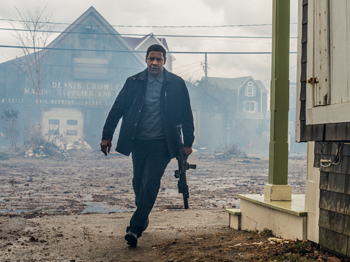
Denzel Washington Returns To One Of His Signature Roles In The First Sequel Of His Career.
Cast: Denzel Washington, Pedro Pascal, Bill Pullman, Melissa Leo
Director: Antoine Fuqua
Genre: Action, Crime
Rated: MA15+
Running Time: 120 minutes
Synopsis: If you have a problem and nowhere else to turn, Robert McCall will help – he is The Equalizer. McCall has been aiding the beaten, exploited, and oppressed by serving an unflinching justice. But when McCall's dangerous past cuts especially close to home, he will need all of his skills to settle the score. This time, he must come face to face with highly trained assassins who will stop at nothing to destroy him. Denzel Washington returns to one of his signature roles in the first sequel of his career.
The Equalizer 2
Release Date: July 19th, 2018
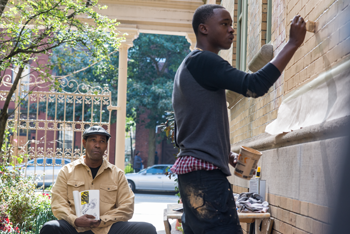 About The Production
About The Production
"I think people enjoy the idea, the myth, that a guy like Robert McCall exists. McCall is a kind of dark angel – the angel we all wish would come down and serve justice to people who deserve it," says Antoine Fuqua, who returns to re-team with Denzel Washington for a fourth time in The Equalizer 2, following their successful collaborations on Training Day, The Magnificent Seven, and the first Equalizer film. "He's found his purpose, becoming a force for justice. Until now, that has been for strangers. But when someone close to McCall is killed, he seeks vengeance for his friend – and for himself."
For Washington, the appeal of McCall is simple: "He's hiding in plain sight, an everyman," says the two-time Oscar®-winning actor. This time around, he's moved on; instead of selling you home improvement goods, he's your Lyft driver – but the avenging angel who has fought for justice for strangers finds himself fighting a more personal battle than ever before. "When we first see McCall, he's trying to help other people who can't help themselves, but it becomes very personal."
The remarkable thing about The Equalizer 2 is the 2: it is the first sequel of Denzel Washington's career. "I've been in this business for forty years and I've never done anything a second time," he says. "The excitement for me comes when I do something new. When it came to this screenplay, the new territory was the relationship with Susan, Melissa Leo's character, and the relationship with the young boy, Miles, played by Ashton Sanders. This film is more of a personal journey for McCall because it is about what happens to people that he's allowed into his life. He was a man who wasn't going to allow anyone in his life, and now, when he opens up to a couple people, it's not good."
For Fuqua and the producers of the film, giving McCall that personal stake in his battles became the driving force. "With the first film, I wasn't surprised that people showed up to see Denzel – but I was surprised at how they responded to the idea of justice more than anything else in the film," says Fuqua. "I think people are feeling like outsiders who have no control over their lives, and we all wish we had a McCall who could swoop in and put us on the right path – not necessarily solve all our problems, but give us a chance to move in the right direction."
"The Equalizer was an origin story," says producer Jason Blumenthal. "Robert McCall had successfully taken himself off the grid and was willing to live that existence until he could no longer turn a blind eye to the injustices around him."
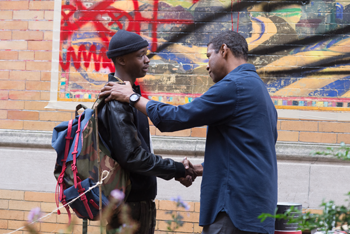 "But we know that the past doesn't stay in the past," says producer Todd Black, picking up the thought. "If the first film was about a man finding the purpose that will guide the rest of his life, this film is about that man applying that purpose, and, seeking revenge, and coming to terms with his past. When we started talking about The Equalizer 2, we had the idea to explore who Robert McCall was – his background. Fortunately, our writer, Richard Wenk, came up with a very good plot that was organic for this next chapter."
"But we know that the past doesn't stay in the past," says producer Todd Black, picking up the thought. "If the first film was about a man finding the purpose that will guide the rest of his life, this film is about that man applying that purpose, and, seeking revenge, and coming to terms with his past. When we started talking about The Equalizer 2, we had the idea to explore who Robert McCall was – his background. Fortunately, our writer, Richard Wenk, came up with a very good plot that was organic for this next chapter."
"Oddly, one of the things that the audiences loved about the first movie was that there was a lot of mystery to it, so I always planned that we would get more personal with McCall when it came to the second one," says Wenk.
In The Equalizer 2, many of McCall's secrets are revealed – his training, his skills, his wife, his relationship with Susan Plummer. "McCall is still struggling with his past, his path, the death of his wife, with what he used to be," says Fuqua. "He finds himself on a path that leads him back home, and as the saying goes, the path home is sometimes the hardest. And sometimes, you literally have to go through a storm to find peace."
Denzel Washington & Director Antoine Fuqua
"With Denzel Washington, there's no single greatest strength – he brings everything as an actor," says Antoine Fuqua. The Equalizer 2 is the fourth time that Denzel Washington and Fuqua are working together. Their other outings – Training Day, The Equalizer, and The Magnificent Seven – were critically acclaimed and box office successes, with Training Day earning Washington the Oscar® for Best Actor. "I'm always fascinated when I'm watching Denzel do his work. He just constantly ups himself, he's always looking to be better. You'd think someone like him would relax a little bit – he's Denzel Washington! But he doesn't behave like that. Denzel will be the first person to tell you: 'I'm not a movie star; I'm an actor.' He challenges me; he's inspiring."
Fuqua – who has also never made a sequel before re-teaming with Washington for The Equalizer 2 – believes that the time was right for a sequel for a few reasons. "I think Denzel enjoys Richard's writing and likes the mystery of Robert McCall," says the director. "We had a great time with Robert McCall the first time. He's quirky, and I think Denzel is always looking for something that different from himself in that sense.
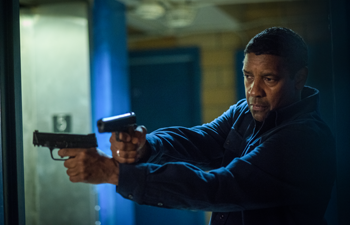 "But Robert McCall is also very similar to Denzel as a person," Fuqua continues. "Denzel wouldn't want me to talk about it, because he doesn't want to take credit for it, but he does a lot for people. He taught me something he learned from Nelson Mandela: a shepherd leads from behind – not from the front. He takes that idea and quietly helps people along the way. I think that was important to him to express in Robert McCall."
"But Robert McCall is also very similar to Denzel as a person," Fuqua continues. "Denzel wouldn't want me to talk about it, because he doesn't want to take credit for it, but he does a lot for people. He taught me something he learned from Nelson Mandela: a shepherd leads from behind – not from the front. He takes that idea and quietly helps people along the way. I think that was important to him to express in Robert McCall."
One way this is expressed is in McCall's choice of reading material – the character reads author Ta-nehisi Coates' Between the World and Me and suggests that Miles (played by Ashton Sanders), a young man who lives in his building, do the same. It was a choice that was inspired by real life, according to screenwriter Richard Wenk. "Denzel gave me the book while we were going through the script together," he says. "I read the book and then discussed its importance with Denzel. We decided to replace the original book I had his character reading with Between the World and Me. It's a seminal work and it helped infuse Denzel's character with a social conscience that was played out between his and Ashton's character."
Wenk, who wrote for Washington and Fuqua on both The Equalizer and The Magnificent Seven, says, "I think with talents as great as these two, you push yourself a little harder to be more creative, more visual and smarter. You want to give Antoine, whose visual style is second to none, a canvas to work with that is not like any other so that he can elevate that. And with Denzel, who is one of the great actors of our generation, you take that into account when you're writing scenes with dialogue and perspectives."
Producer Todd Black, a collaborator with Denzel Washington since Washington's directorial debut Antwone Fisher, says, "Antoine and Denzel really trust and respect each other. I think that mutual trust is the basis for a terrific relationship: Denzel can focus on his performance, knowing that Antoine has all of the action figured out; and Antoine knows he can count on Denzel to deliver three different takes, each amazing in its own way, that will give him a choice in the cutting room."
"Antoine and I have had a lot of success together," says Washington – noting that the success is not only commercially, but crucially as well. "He really knows how to make this type of film."
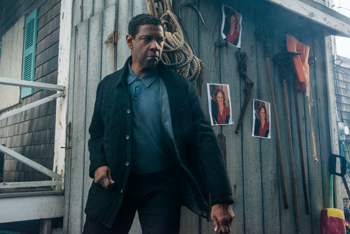 "Antoine's style of action is so unique and specific, and when you can merge that with a great story, it's magic!" Black continues. "It's almost like an accordion. Antoine knows when to bring it together and he knows when to pull it apart; he knows when to make it loud and when to make it quiet."
"Antoine's style of action is so unique and specific, and when you can merge that with a great story, it's magic!" Black continues. "It's almost like an accordion. Antoine knows when to bring it together and he knows when to pull it apart; he knows when to make it loud and when to make it quiet."
Fuqua, working with Stunt Coordinator Jeff Dashnaw, built action scenes around Washington's unique skills and talents. "Robert McCall's speed is very fast, so we have to shoot it in a lot of cuts – if he does it all at once, we will never see what he did," says Dashnaw. "Denzel is actually very fast with his hands, and he picks up the action choreography very quickly. He's been boxing for most of his adult life, so we add some of that in there for him and kind of give him a lot of different disciplines. In addition, fight choreographer Mick Gold has some very special skills that he has been working with and working into this film to make it a little different."
To bring the audience into the world of Robert McCall, Fuqua employs what he calls "Equalizer-vision." "His heart slows down, his pupil dilates, more light comes in an his vision gets sharper. He becomes more aware of everything in the room. Violence is a comfort zone for him," says Fuqua. "He is a man who can instantly assess a room – he knows your weak spot, he knows where the weapons are. And everything is a weapon – a pen, a piece of paper, a clipboard."
The Equalizer 2, Fuqua says, was an opportunity to explore what life must be like for such a man. "If violence is a comfort zone, who do you balance that?" he says. "If you release men of violence into the real world, who is there to help them? For McCall, that's Susan Plummer – she understands him, she brings him back from the darkness, she gives him everything he needs to function. He loves her – the only thing in the world he loves, outside of his wife. So her death is very personal to him."
Casting The Film
At the center of the film is the relationship between McCall and his onetime handler, Susan, played by Melissa Leo, and her husband, Brian, played by Bill Pullman. "In this movie, Susan and McCall are still best friends, and they now have a very quiet but active working relationship," says Black. "She is very much active in the government and very much active with giving McCall the information he needs to be The Equalizer."
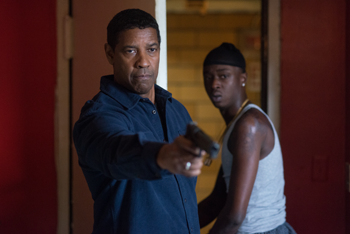 "In the first film, it was Susan who gave McCall the advice he needed: he's good at helping people; he's good at righting wrongs, and she suggests that he help people," says Leo. "In this film, McCall is going to have to turn his attention to himself and find a way to equalize his own life."
"In the first film, it was Susan who gave McCall the advice he needed: he's good at helping people; he's good at righting wrongs, and she suggests that he help people," says Leo. "In this film, McCall is going to have to turn his attention to himself and find a way to equalize his own life."
"The invitation to return to The Equalizer 2 was delightful because the first one had been so wonderful to work on," Leo continues. "The most wonderful thing about it are the two men at the helm – Antoine Fuqua and Denzel Washington. Antoine never makes the same film twice; he keeps aiming higher. And this film will be better than the first; Antoine has that ability to do that with the storytelling."
Bill Pullman returns as Brian Plummer, Susan Plummer's husband.
"I'm a bit of a sucker for a premise like this"where the central character is humble, doesn't want to be seen, and has a code," says Pullman. "It's a little bit like a Western, where the central character has principles that he sticks to even though sometimes it gets trying for him."
He smiles, "And that my character would have a corner of the pie of some of the action sequences."
In his desire to connect with the people around him, Robert McCall has moved from Chelsea to an apartment complex right off Massachusetts Avenue, a major thoroughfare that runs through the heart of Boston. He is friendly with his neighbors, and forges this mentorship with a teenager named Miles, who lives with his single mother in the same complex.
"When McCall sees the young, talented Miles, he knows that the young man is teetering," says Richard Wenk. "McCall senses this young man is being sucked into the wrong environment and becomes a father figure to him."
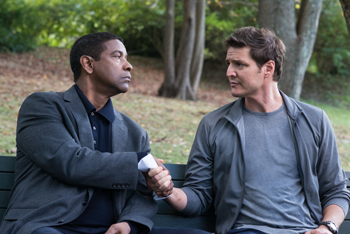 "I was really keen about the father-son story between McCall and the young boy, helping him navigate through life," says Washington. "I saw the opportunity in this relationship to speak to young people by exploring this mentorship."
"I was really keen about the father-son story between McCall and the young boy, helping him navigate through life," says Washington. "I saw the opportunity in this relationship to speak to young people by exploring this mentorship."
"Denzel called me one day and said, 'Really what this movie is about is it's about a father and a son,'" says Black. "'Robert McCall has to learn to become a father. I have to treat Miles as my son and I have to steer him. That's what the core of the movie is about; we can't lose sight of that"Antoine can't lose sight of that, Richard can't lose sight of that, you can't lose sight of that!''"
"This relationship is part of the backstory to McCall," Washington continues. "He's not let anyone really into his life, or the people that he has let in, he has lost. So, he's hesitant about letting this kid into his life too soon, but he eventually does."
Ashton Sanders, who first came to critics' attention for his role in the Academy Award®- winning Moonlight, landed the role.
"Ashton blew us away," says Blumenthal. "His reading was real, raw and honest. By casting Ashton, not only do we have a phenomenal, young, new actor who is going to be around, but we have a relationship that is true and authentic with Denzel's character. And those two words – true and authentic – are words that Antoine Fuqua has used every day when we have discussed this movie."
Sanders describes his thoughts about the role, "Miles is a good kid, but is slowly starting to get involved in a lifestyle that can be potentially dangerous for him. He lacks positive guidance, and McCall becomes that for him."
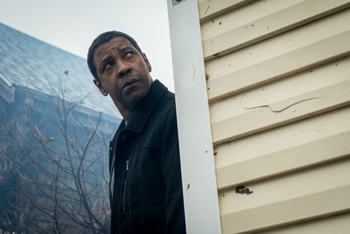 "In the first film, McCall was a savior within the community, so I think he's doing the same with Miles. Saving him," Sanders continues.
"In the first film, McCall was a savior within the community, so I think he's doing the same with Miles. Saving him," Sanders continues.
As McCall begins to take vengeance on the people who killed Susan – his former handler and adviser – he is brought back in contact with the people who were once closest to him: his former cell of operatives. "They were an operation of five highly skilled individuals tasked with going overseas, killing or kidnapping high value targets," says Wenk. "They are the most skilled assassins on earth. Robert McCall was a part of this team which involved four other men. But after losing his wife, McCall decided he wanted no more of this – and when a car bomb exploded, he took the opportunity to walk away and let the world consider him dead."
But even after McCall faked his death, life went on for the other four. What happened to them? Wenk continues, "Our technical advisors on the film are SAS and Navy Seals; they all have the same stories. One of them said to me, 'They train us to kill, but they don't untrain us. What do we do? What do we put on our resumes? 'Assassin?''" "This was a brotherhood," says Blumenthal. "They saw and did things that most people could never handle. Because of that, these were five guys were willing to die for each other."
For Washington, it was important to separate McCall from the rest of the group. "It was important to Denzel that he wasn't just a guy who carried a gun and shoots people. He wanted to be smarter than the average black ops guy," says Blumenthal. "McCall is way above that – the group that Susan Plummer formed are the elite of the elite." And each member of the group has his own specialty. "Just because you do the same things as others doesn't mean you have the same skill set," says Washington. "You may have been trained the same way all boxers are trained, but that doesn't mean all boxers are all world champions."
The group of operatives is composed of York, played Pedro Pascal, who rose to prominence for his role in "Narcos"; Resnik, played by Jonathan Scarfe ("Van Helsing"), Ari, played by Kazy Tauginas, an up-and-coming actor, and Kovac, played by newcomer Garrett A. Golden.
"Pedro's read was different than the others because he brought a warmth and a friendship layer to this character that no one else had done," says Blumenthal.
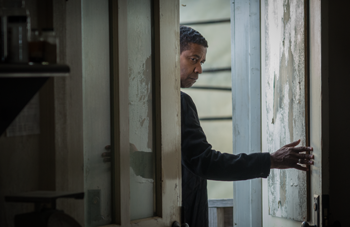 "York – that's my character – and McCall were essentially partners back in the day," says Pascal. "They are a part of a mysterious, elite group of highly trained government soldiers – part of the government's most hidden elements. He and I were in the same explosion that I survived and he presumably didn't. York has mourned him for seven years, believing him to be dead. Their connection is one of friendship, one of trust, partnership, mentorship. I would choose it as my character's deepest relationship." Pascal was thrilled by the opportunity to play opposite Washington in a high-intensity thriller. "I would say the incredible appeal of The Equalizer is that you have the ultimate badass actor playing the ultimate badass role," he says. "He's a highly trained killer, using that training and that talent for good."
"York – that's my character – and McCall were essentially partners back in the day," says Pascal. "They are a part of a mysterious, elite group of highly trained government soldiers – part of the government's most hidden elements. He and I were in the same explosion that I survived and he presumably didn't. York has mourned him for seven years, believing him to be dead. Their connection is one of friendship, one of trust, partnership, mentorship. I would choose it as my character's deepest relationship." Pascal was thrilled by the opportunity to play opposite Washington in a high-intensity thriller. "I would say the incredible appeal of The Equalizer is that you have the ultimate badass actor playing the ultimate badass role," he says. "He's a highly trained killer, using that training and that talent for good."
"It's very difficult to find somebody to play opposite Denzel Washington," says Fuqua. "You have to find an actor who can hold is own and is not going to be intimidated." Intimidation can come in very different ways. "On my first day on set, I hadn't met Denzel, and he was kind enough to come to my trailer and introduce himself very early in the morning. We got to chat for a good hour and a half before we started shooting. The scene we shot is the first time my character sees him and processes that McCall is not dead – Denzel filled the moment with a very powerful hug of friendship – not seeing me process the complexity of what it would mean to see him, this most important man in my life – to hide of all of the secrets that could spill from my expression the moment he calls my name."
Recreating A Category 5 Hurricane
"When I first read the script and I read hurricane, I thought, really? How am I going to pull that one off?" Fuqua laughs.
Screenwriter Richard Wenk conceived that the third act of the film will take place during a Category 5 hurricane. He says, "In the first movie, we're in Home Mart with four walls. For this one, we wanted it to be bigger, so the idea came about that our hero would be going to his hometown during a hurricane. And since everyone has been evacuated, there would be no collateral damage with what McCall plans to do his targets."
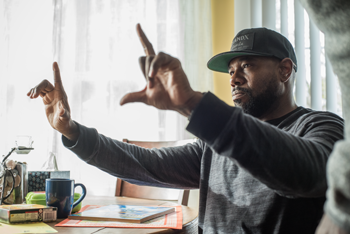 Production decided to set the hurricane in the Marshfield neighborhood of Brant Rock, which is located on the south shore of Massachusetts, about an hour's drive from downtown Boston. Taking place during daylight hours, it took almost a month to film the hurricane sequences.
Production decided to set the hurricane in the Marshfield neighborhood of Brant Rock, which is located on the south shore of Massachusetts, about an hour's drive from downtown Boston. Taking place during daylight hours, it took almost a month to film the hurricane sequences.
"We took over the whole town," says Fuqua. "We put stuff everywhere – on top of cars, huge jet fans that we had to move constantly, 30 or 40 feet of giant tanks creating a wave crashing over the wall, debris flying everywhere, actors getting wet… and because it's a hurricane, you can't use the sun, so whenever the sun comes out, you just have to wait. You can't hear the dialogue over the fans, but the actors have to give a performance."
Despite the challenge, Fuqua captured as much of the sequence with practical effects, in camera, as he could. "You don't know if visual effects will be able to capture all the little nuances that you want to capture. If you look closely, every shutter in town is banging and moving – I didn't want to have to rely on visual effects for that."
Special Effects Coordinator Jeremy Hays and his team were responsible for creating the hurricane's verisimilitude. He remembers, "We looked at a lot of footage from Hurricane Sandy, which actually took place in Brant Rock. Waves and wind were a key part of the overall story." The crew would watch hundreds of hours of YouTube videos of real hurricanes as they began to prepare to create their own.
"Antoine wanted to create wave after wave after wave, so we came up with a system that would allow us to constantly fill individual cones that were used to fire the cannons of water," Hays continues. "Then we had 1,600 CFM air compressors that provided air to the pressure tanks. We had a total of 24 individual cannons that we pieced together so we could aim them in different directions, depending upon where the camera was placed."
To create the wind, Hays and his team used similarly powerful machines. "We had twelve wind machines in twelve different positions around the town," Hays recalls. "The biggest fan we had was a 480-volt ventilation fan that is used to clear tunnels and can clock up to 80 miles per hour. And we went through at least two to three 55-gallon bags of leaves during each take, so that it looks like debris is blowing around."
 Later, visual effects added larger debris items, adding to the hurricane's danger. "This is my fifth collaboration with Antoine and it just gets better every time because we have such a short hand of knowledge," says Visual Effects Supervisor Sean Devereaux. "If I show him something that I'm matching, he goes, 'That's what I want!' and we go create it. I understand his vision very well at this point and our team does well."
Later, visual effects added larger debris items, adding to the hurricane's danger. "This is my fifth collaboration with Antoine and it just gets better every time because we have such a short hand of knowledge," says Visual Effects Supervisor Sean Devereaux. "If I show him something that I'm matching, he goes, 'That's what I want!' and we go create it. I understand his vision very well at this point and our team does well."
Still, Hays and Devereaux felt that if the audience never notices their work – as they are simply drawn into the dramatic climactic fight – then they will feel satisfied.
The Equalizer 2
Release Date: July 19th, 2018
MORE
- Mission: Impossible Fallout
- Glenn Close The Wife
- Allison Chhorn Stanley's Mouth Interview
- Benicio Del Toro Sicario: Day of the Soldado
- Dame Judi Dench Tea With The Dames
- Sandra Bullock Ocean's 8
- Chris Pratt Jurassic World: Fallen Kingdom
- Claudia Sangiorgi Dalimore and Michelle Grace...
- Rachel McAdams Disobedience Interview
- Sebastián Lelio and Alessandro Nivola...
- Perri Cummings Trench Interview



